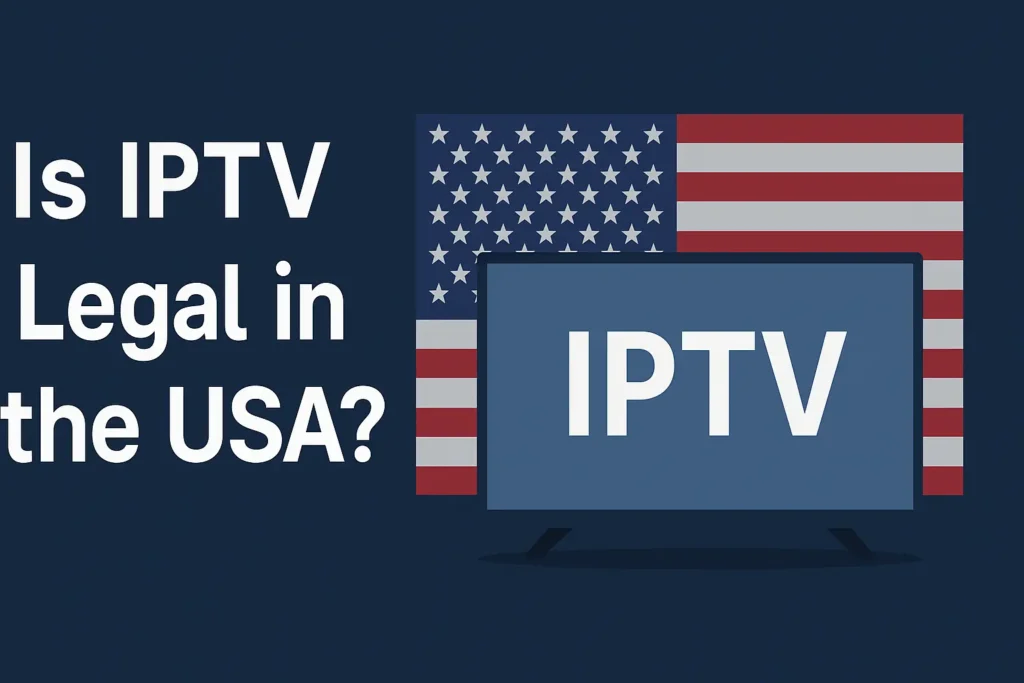What Is IPTV?
Let’s start with the basics. IPTV(short for Internet Protocol Television)Lets you stream live TV and on-demand content through the internet, not cable or satellite.
You just need a device (Smart TV, Firestick, smartphone, etc.), an app, and a subscription — either via Xtream Codes or an M3U link. Simple, right?
So, Is IPTV Actually Legal in the United States?
Yes.
IPTV is 100% legal in the U.S.—as long as the service provider holds official licenses to broadcast the content.
Licensed IPTV services follow U.S. copyright laws, pay for content distribution rights, and operate just like cable companies.
When Does IPTV Become Illegal?
Not all IPTV is created equal.
It becomes illegal when providers stream copyrighted content without permission. These services don’t pay for licenses but offer premium content for suspiciously low prices.
Red Flags for Illegal IPTV:
- Plans that cost cheap with hundreds of premium channels.
- Access to PPV events and international sports at no extra cost
- Encouragement to pay in crypto
- Instructions to use a VPN to “stay safe”
- Sideloaded or unofficial apps (not in the app store)
If it sounds too good to be true—it probably is.
What Laws Govern IPTV in the U.S.?
Two major legal frameworks apply:
1. The DMCA (Digital Millennium Copyright Act – 1998)
This law requires IPTV services to obtain licenses for copyrighted content. If they don’t? They’re breaking the law—and that goes for users too.
2. Protecting Lawful Streaming Act (2020)
This newer law made it a felony to operate large-scale illegal streaming services. That means running (or promoting) illegal IPTV platforms can result in fines and prison time.
No U.S. state bans IPTV—but illegal content is still illegal, no matter where you live.
Legal vs. Illegal IPTV: A Quick Comparison
| Feature | Legal IPTV | Illegal IPTV |
|---|---|---|
| Proper licensing | ✔️ | ❌ |
| Official app availability | ✔️ Google/Apple Store | ❌ Sideloaded APKs |
| Transparent pricing | ✔️ Comparable to cable | ❌ Extremely low (~$10) |
| Payment options | ✔️ Credit card, PayPal | ❌ Crypto, Zelle, gift cards |
| Company reputation | ✔️ Big names & support | ❌ No support, hidden ownership |
| Content scope | ✔️ Legal channels & VOD | ❌ “All-access” w/ PPV & sports |
The Real Risks of Using Illegal IPTV
If you’re using shady services, here’s what you’re exposing yourself to:
- Legal Consequences
The Department of Justice has taken down dozens of IPTV operations. End users can face civil suits or fines. - Malware & Scams
Many illegal IPTV apps carry spyware, malware, or hidden scripts that compromise your data. - Streaming Failures
These services often go dark without warning, leaving users without access or refunds. - ISP Action
Your internet provider may throttle or suspend your connection if you’re caught using unlicensed streams.
Use a VPN to Protect Yourself
Even if you’re using a legal IPTV service, a VPN (Virtual Private Network) adds a crucial layer of privacy.
Here’s why it matters:
- Encrypts your connection : so no one including your ISP can track what you’re watching
- Prevents throttling : ensuring smoother streaming speeds
- Shields your IP address :from potential tracking or data collection
- Adds security :when using public or unsecured networks
Stick with reputable VPNs like NordVPN, Surfshark, or ExpressVPN. Avoid free VPNs—they often log your data or inject ads.
Using a VPN doesn’t make illegal IPTV legal, but it does help protect your identity and viewing activity—especially in the wild west of online streaming.
Final Verdict:
Let’s cut through the confusion:
📌 IPTV is legal in the U.S. only when it comes from a licensed provider.
If you’re using services like YouTube TV you’re in the clear. But if you’re tempted by a very cheap service promising all channels, sports, and adult content—you’re playing with fire.
Before subscribing to any IPTV platform, do your homework:
- Verify their licenses
- Check their payment options
- Look for official apps
- Avoid services that hide their identity or ask for crypto
Feel free to contact us via email or WhatsApp if you have any questions — we’re here to help you.
Frequently Asked Questions (FAQ)
Do I need a VPN for IPTV in the USA?
It’s not legally required, but using a VPN is highly recommended. It protects your privacy, prevents ISP throttling, and keeps your streaming habits hidden from third parties — especially useful if you value digital privacy.
Can your ISP see if you’re using IPTV?
Yes, your Internet Service Provider can see the data you’re accessing, including whether you’re streaming from known IPTV servers. That’s why many users choose to use a VPN, which encrypts their traffic and hides IPTV usage from their ISP.
Can IPTV streaming be tracked?
Without a VPN, yes. Your IP address and activity can be logged by your ISP or even by certain IPTV providers. A VPN shields your location and encrypts your traffic, making it much harder to trace.
Is IPTV free or paid?
IPTV can be both.
- Free IPTV : options exist, but they usually come with ads, limited content, or reliability issues.
- Paid IPTV services (especially legal ones) offer high-quality streaming, more channels, and better support, often priced between $19–$80/month depending on the provider.



